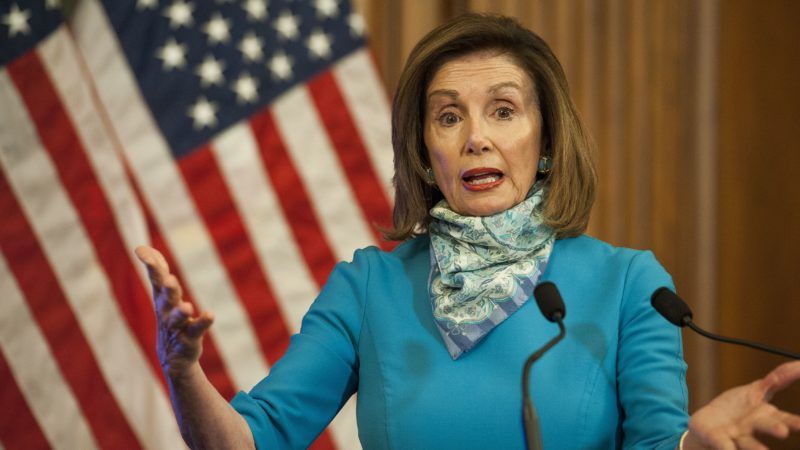The Next Coronavirus Stimulus Bill Is Here. It's a $3 Trillion Spending Plan That Bails Out States and the Post Office.
The new bill includes another round of stimulus checks for all Americans, funds additional coronavirus testing, and spends billions to bail out states and government agencies straining under pension debt.

Another stimulus bill could be on its way through Congress by the end of the week, as House Democrats on Tuesday announced plans for $3 trillion in new spending to combat the economic consequences of the COVID-19 pandemic.
The new $3 trillion Health and Economic Recovery Omnibus Emergency Solutions Act (HEROES Act) would nearly double the $3.6 trillion in stimulus spending already approved by Congress since mid-March—and that's after Speaker of the House Nancy Pelosi (D–Calif.) stripped out about $1 trillion in additional spending requested by various lawmakers, Politico reported. The new bill includes another round of stimulus checks for all Americans, funds additional coronavirus testing, and spends billions to bail out states and government agencies straining under pension debt and a collapse of tax revenue due to the coronavirus.
In its current form, it would surpass the $2.2 trillion Coronavirus Aid, Relief, and Economic Recovery Act (CARES Act), passed in late March, as the largest stimulus spending bill in U.S. history. The Treasury has already borrowed more than $3 trillion in just three months, and the new proposal will certainly add to that total.
The draft of the bill released Tuesday includes a $25 billion bailout for the cash-strapped U.S. Postal Service, which could lose as much as $13 billion this year and is on a fiscally unsustainable path.
The HEROES Act also contains $540 billion in aid for states and $375 billion for local governments. That's in addition to the $150 billion relief fund for states established by an earlier stimulus bill.
The bill also includes another round of stimulus checks for all Americans, with payments capped at $1,200 for individuals and another $1,200 per dependent, with a maximum of three dependents allowed. Those payments will be means-tested in a similar way as were earlier payments authorized by the CARES Act. The HEROES Act also incorporates a Democratic proposal to provide $100 billion in new funding to a Housing and Urban Development program offering assistance to renters.
The 1,800-page bill would also extend the boosted unemployment payments authorized by the CARES act through January 2021. Those extra $600 in weekly unemployment payments are meant to soften the blow for laid-off workers at a time when the unemployment rate has spiked to 14 percent and is likely to go higher. But the added unemployment payments are also likely to make reopening the economy more difficult, as workers may be hesitant to return to their jobs as long as the boosted benefits remain available.
The HEROES Act also includes some provisions that seem unrelated to the public health and economic crises unleashed by the pandemic, like a provision that would temporarily reinstate the state and local income tax deduction—known as the SALT deduction. That deduction, which primarily benefits wealthy people who live in states and localities with high taxes, was capped by the 2017 federal tax reform law. Restoring the deduction has been on Democratic to-do lists ever since.
The omnibus bill also includes a provision giving marijuana-based businesses greater access to banking. That's a worthwhile (and long-awaited) measure, but another thing that seems disconnected from the stated purpose of the HEROES Act.
In some ways, however, the HEROES Act is already looking like a return to some sense of normalcy in Congress—though "normal" is nothing too great when it comes to congressional spending. The bill has already drawn more opposition than the first three rounds of coronavirus stimulus, which passed quickly and with only token opposition, and is likely to be subject to significant negotiation and rewriting before it is passed.
The Postal Service bailout is one point of contention, with the White House and Republican lawmakers opposing a similar plan in earlier rounds of coronavirus stimulus. The timing of the new bill has also been questioned by Senate Majority Leader Mitch McConnell (R–Ky.), who on Monday said Congress needed to give the previous stimulus spending more time to have an impact.
McConnell has also expressed worry over the mounting levels of debt. "We now have a debt the size of our economy," McConnell said Monday. "We have to take a pause here and take a look at what we've done."
Republicans have mostly abandoned fiscal conservatism since President Donald Trump took office, but the prospect of borrowing another $3 trillion right now might get those embers burning again.
Asked about McConnell's comments, Pelosi told MSNBC's Chris Hayes on Monday night that waiting was not an option.
"We have to put money in the pockets of the American people, recognizing the pain, the agony that they are feeling," she said. "To those who would suggest a pause, I'll say the hunger doesn't take a pause. The rent doesn't take a pause."
The passage of another major spending bill to respond to the economic crisis created by the pandemic seems almost inevitable. If not by the end of this week, then it will probably happen sometime in the near future. The failure of lawmakers to use the economic boom of the past decade to fix America's fiscal problems—the national debt, the Post Office, state pension systems, and so on—has never seemed more foolish.


Show Comments (171)